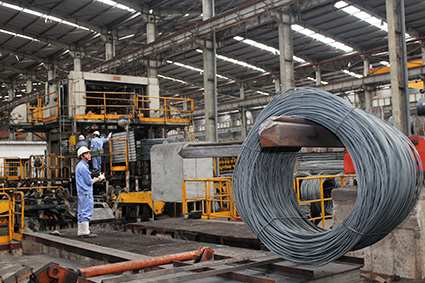 Economy
Economy


|
| Steel production at the Kyoei Việt Nam Steel Company in Tam Điệp Industrial Zone, Ninh Bình Province. — Photo baoninhbinh.org.vn |
HÀ NỘI — The steel industry is facing lawsuits against tax evasion and dumping, according to information from the Việt Nam Steel Association.
The Trade Remedies Authority of Việt Nam said that anti-trade investigation measures against Việt Nam's exports were on the rise.
Products under investigation are mainly iron, steel, fibre, household appliances and electronics. In addition, domestic steel brands have been counterfeited.
Nguyễn Văn Sưa, a steel industry expert, said that many lawsuits against the domestic steel industry in recent years stemmed from the fact that foreign products were transferred to Việt Nam for processing and were then labelled as originating from Việt Nam.
This example of trade fraud greatly affected Vietnamese goods when they were exported to other markets.
As they evade tax, many steel products imported into Việt Nam were cheap compared to domestic products. Therefore, co-ordination between related ministries and branches would be necessary, he said.
Sharing the view, Dr. Phạm Sỹ Thanh from the Việt Nam Institute for Economic and Policy Research, said that it would be a disaster if foreign goods "borrowed" Vietnamese origin, then were exported to other markets.
This would have a long-term negative impact on the whole industry, he said.
How to combat fraud?
In order to effectively handle violations in the origin of goods, Minister of Industry and Trade Trần Tuấn Anh directed the Trade Remedies Authority of Việt Nam to establish a standing team to increase state management on trade remedies and origin fraud and finalise action plans, co-ordinating with concerned ministries and branches in implementing them.
The Minister also asked C/O (certificate of origin) issuers and customs authorities to tighten the issuance of C/O, as well as strengthen inspections on enterprises with sudden export volume increases.
This was a necessary move to improve the control of goods origin and combat fraud, the minister said.
Nguyễn Văn Sưa said that authorities needed to have policies to protect the domestic market and restrict the import of domestically produced products. In particular, they need to promote the use of trade defence tools and prevent shoddy goods.
However, the core issue lay with the enterprises, which are under pressure from trade remedies, so the initiative in domestic raw material supply plays an important role, according to Sưa.
Nghiêm Xuân Đa, Chairman of the Vietnam Steel Association, said that enterprises must work together and provide information to the association to avoid surging export growth to new markets such as Canada and Mexico when the Comprehensive and Progressive Agreement for Trans-Pacific Partnership (CPTPP) comes into effect. This would reduce losses when countries initiate investigations and apply trade remedies on Việt Nam's exported steel products.
In addition, the authorities needed to strengthen protection of domestic production with technical and trade barriers, he advised.
He advised preventing the transfer of foreign investment into the country with inappropriate technologies which consumed a lot of energy and caused environmental pollution. — VNS




